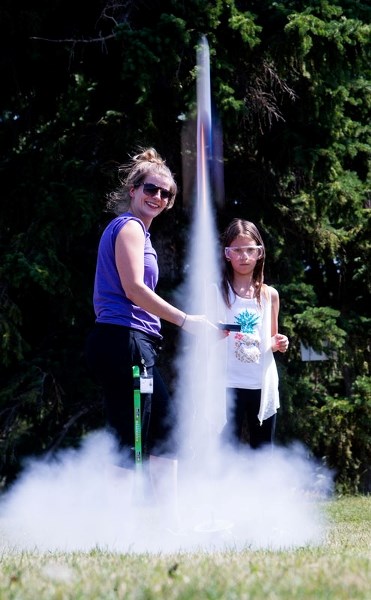If you feel the need for speed, and you're over 18, you'll find plenty of it this Thursday at the Edmonton space and science centre.
Up to a thousand adults are expected to zip over to the Telus World of Science in Edmonton on July 20 for the bimonthly Dark Matters event, where they will get to enjoy science-related activities and socialize over music and drinks.
"Often adults don't have a chance to engage with science past high school," said staff scientist Marie McConnell. Dark Matters combine science and partying to connect adults with local scientists over music and drinks.
The theme of this month's event is speed, which is otherwise known as velocity or distance over time. Visitors will get to build their own drag racers, launch rockets, and race on giant tricycles.
"Top of everyone's mind as soon as we said 'speed' is racing," McConnell said, so they'll have a display of antique race cars and a showing of the Imax film Super Speedway for people to check out.
The University of Alberta's Formula SAE team will be there with the race-car they designed, built and raced earlier this summer, as will the AlbertaSat squad, which recently deployed its first cube satellite, she continued. Also there will be numerous U of A athletes and members of the local speedcubing community, who will demonstrate how to solve Rubik's Cubes really fast.
Ken Mueller and the Edmonton Rocketry Club will be at the event with some of their swiftest up-goer fire tubes. These rockets are so powerful that you need certification and air traffic control clearance to launch them, Mueller said.
"The fastest one I have right now will hit 2,100 kilometres an hour," he said, and produces a sonic boom.
Rocketry is probably one of the fastest hobbies around, especially when you use the really big engines that can reach 50,000 feet, Mueller said. Those ones can be up to 10 centimetres wide and are often fuelled by ammonium perchlorate – the same stuff the space shuttle used in its solid fuel boosters.
Some of these motors burn in half a second and reach their top speed in three, he continued.
"You basically blink and miss it."
How fast is fast?
Speed is always measured relative to something else due to the way space and time work, explained U of A physicist Roger Moore. Nothing has zero velocity, but many things have zero acceleration.
Physicists agree that nothing in the universe can go faster than the speed of light in a vacuum, which is about 299,792,458 m/s (fast enough to circle the Earth about 7.5 times a second), Moore said. Photons are the only objects that can hit that speed – anything with mass would require an infinite amount of energy to reach it.
The fastest object ever created by humans was a proton in the Large Hadron Collider (LHC), which reached about 99.99996 per cent of the speed of light, Moore said. Cosmic rays go even faster.
Weird stuff happens when you go this fast.
"If you look at an object that's moving close to the speed of light ... it appears to get shorter and shorter and shorter," Moore said.
This is an example of Lorentz contraction, which is caused by light from the front of the object reaching us at a different time than light from the back. Researchers have actually seen spherical ions turn pancake-shaped in the LHC because of this phenomenon.
Objects moving really fast also appear to slow down in time, Moore continues. If a spaceship travelling at near light-speed zipped past you, the astronauts on it would seem to be moving in slow motion.
Researchers have long known that GPS satellites actually move fast enough for this time-dilation effect to matter. Navigation devices have to account for it in their calculations as a result.
Dark Matters is an 18+ event that runs from 7 to 10 p.m. Tickets are available at telusworldofscienceedmonton.ca/dark-matters, and will presumably go fast.




